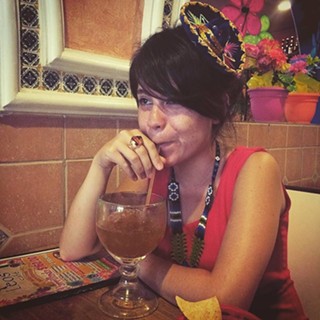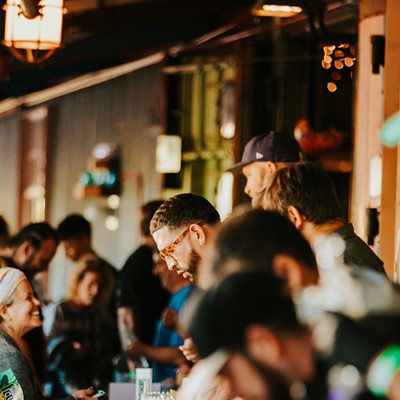As a new collaborator of the 420 Social Club, =Spencer Grijalva went into it with one of his best friends in mind.
His friend, who'd like to keep his name private, was diagnosed with non-Hodgkin's lymphoma—a type of blood cancer—about one year ago. Grijalva saw his friend go through the unpleasant side effects of chemotherapy and slowly deteriorate. Knowing firsthand the medicinal benefits of pot (the 22-year-old medicates to treat his severe scoliosis and other football-related injuries, including multiple concussions and knee surgeries), Grijalva helped his friend get a medical marijuana card to try and alleviate the situation.
So far, it's working. The only issue is his friend is not able to medicate while he gets his treatments at the hospital. Like many around the state, medical marijuana is a no-no at Banner-University Medical Center.
When Arizona voters passed the Medical Marijuana Act in 2010, it had a clause that gives hospitals the discretion to allow or prohibit patients from having pot in any of its forms, including edibles.
The clause says the MMJ Act isn't allowed to force any person or establishment "in lawful possession of property" to let a guest or client use marijuana while in that property. Although UMC did not specify the reasons it chose to go the prohibition route, it could stem from where marijuana stands at a federal level, according to UMC Communications Specialist David Mogollón.
Although medical marijuana is legal in more than 20 states, pot is still considered a schedule 1 controlled substance by the Drug Enforcement Agency. The DEA argues there is not enough medical or scientific evidence to remove it from that category, a study in the National Institute of Health said.
"As states debate the most effective ways to administer a medical marijuana program, hospitals and pharmacies are commonly mandated to be in charge of distribution," the study said. "In view of the ambiguity in federal and state laws, this pivotal role places facilities in potential legal peril. Under these circumstances, intentional violation of the Controlled Substances Act could lead to fines or imprisonment for employees, closure of a facility, loss of DEA controlled-substances registration and facility licensure, and loss of federal health care funding."
At Tucson Medical Center, spokesman Michael Letson says the main reason he'd think the hospital wouldn't allow patients to bring medical pot is the potential of weed and the medications administered by the hospital having a damaging reaction in the patient. TMC has that same rule in place for other prescription drugs to avoid a meds cocktail effect.
On Friday, Grijalva and his friend met with UMC Cancer Center representatives to discuss a possible collaboration between the medical marijuana house and the hospital. Patients who can't medicate there can head down to Fourth Avenue—the 420 Social Club's doors are open to all cardholders, Grijalva says.
Since it officially opened its doors in December, the 420 house has accommodated 150 cardholders with a variety of conditions—from post-traumatic stress disorder to cancer and chronic pain.
Right now, they are looking into renovating the building to better accommodate patients who are in-and-out of the hospital. For starters, they are planning to build a ramp in the back of the house for people on wheelchairs.
Grijalva says he'd also like to talk to the patients about what medical marijuana strains work best for their symptoms, so that the house can begin carrying these.
If they're able to kick start a relationship with places like UMC, the house would offer cancer patients a free membership—veterans already get that, says Mark Brown, a 420 Social Club member since its inception.
Eventually, they'd like to reach out to all Tucson hospitals that prohibit the use of medical marijuana so they can refer some of their patients to the 420 house.
"We want to have a place where people feel comfortable and safe. When you are medicating, you have to have a good state of mind," Grijalva says. "Hiding yourself while medicating, it brings your whole demeanor down. With cancer, trying to get through every day, you need to have a place where it is positive."










